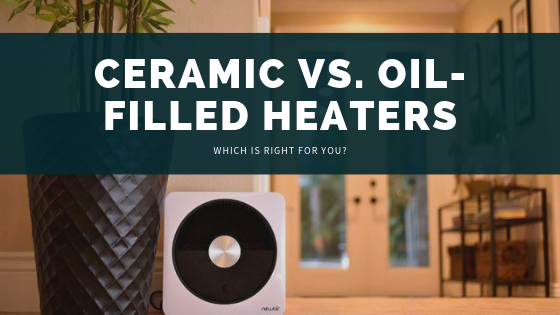Are Ceramic Heaters Safe to Leave Overnight? Everything You Need to Know About Space Heater Safety
It's easy to forget about the drafty parts of your house during the summer, but when the first icy blasts of winter arrive, you'll know it. If you live in a home with older windows or insufficient insulation, you're bound to notice cold spots where your central heating system just can't get the job done. If you rent, you may not have a lot of control over your thermostat or the way heat is distributed in your apartment, making some rooms stifling while others stay chilly.
Instead of suffering through a long, cold winter, a portable heater could be just the thing you need to make life a whole lot more comfortable. Modern space heaters are much safer and more efficient than ever before, so you should be able to find a model that does the job without having to worry about the risk of a home fire. Here's what you need to know about electric heater safety to make sure you're both comfortable and protected this season.
Space Heater Safety Tips
According to the National Fire Protection Association (NFPA), space heaters were responsible for about 7 percent of all house fires in the United States between 2011 and 2015. This is mostly due to the heating element being placed too close to things that can burn, particularly fabrics like bedding and curtains.
These fires can also be deadly: Space heaters accounted for 85 percent of home heating fire deaths during this period. To make sure that you don't become a statistic, follow these basic space heater safety tips:
1. Practice Smoke Alarm Safety
It's absolutely critical to test your smoke alarm batteries once a month by pressing the button and listening for the beep to make sure they're in good working order. You should also replace the batteries every six months — and replace the entire smoke alarm every ten years. Never disconnect the smoke alarm due to a false alarm, as you may forget to reactivate it. To help you stay on track with your smoke alarm maintenance, set reminders on your smartphone's calendar or to-do list.
2. Keep Flammable Items Away From Space Heaters
Whether you use a propane heater in your garage or an electric space heater in the living room, they must be kept clear of combustible items, including papers, furniture, fabrics and other loose items. The NFPA recommends keeping a clear space of at least three feet in every direction to avoid items accidentally falling on to the space heater and igniting.
3. Protect Children and Pets From Burns
Likewise, it's a good idea to keep the three-foot rule in place when it comes to humans. Sitting too close to your heater is likely to be uncomfortable, and allowing children and animals to get too close could result in burns, particularly if they touch the hot fins of an oil-filled radiator type heater. To prevent this, do your best to keep space heaters where your vulnerable family members can't reach them. Never leave children or pets unattended in a room with a space heater running.
4. Operate Space Heaters in a Safe Location
In addition to keeping portable electric heaters a safe distance from objects and people, it's also critical to make sure they're on a solid, level surface where they won't tip over. This should be a hard floor rather than plush carpet, and you should never operate the heater near water sources that could cause it to short out.
5. Always Plug in Properly
Never plug your space heater into an extension cord or power strip. Your space heater uses a lot of power to operate, and these temporary solutions aren't designed to handle the heat. They can melt, spark or otherwise become a real fire hazard that ignites a serious blaze. Plug your space heater directly into the wall, and don't add another appliance or lamp to that outlet to help prevent overheating. If you use a ground-fault protected outlet — the kind with the red "test" button — stop using your heater right away if it trips off.
6. Consider Using a Dedicated Circuit
Houses with old wiring systems may not have enough power to a given electrical outlet to allow the heater to draw the required 1,000 watts or more of power. If this is the case in your home, you may find that the space heater trips your circuit breaker and plunges you into darkness. In this case, you shouldn't use any other appliances on any outlet attached to that circuit breaker. You can avoid this issue by having an electrician install a dedicated circuit that only leads to one outlet — the one you plug your space heater into during the winter months.
7. Never Leave Your Heater Running Unattended
When you leave the room, you need to turn off your space heater. This is the very best way to make sure that it doesn't tip over and that nothing flammable accidentally comes in contact with the heating element. If you need it to heat a bedroom overnight, look for additional safety features that you can feel comfortable with if you need it to stay warm while you're sleeping — and consider adding a smoke alarm to the bedrooms where they'll be in use.
8. Never Use Gas Heaters in Your House
Some garage heaters use natural gas or propane as fuel instead of electricity. While these are perfectly safe when installed correctly with proper piping to vent carbon monoxide and other fumes to the outside of the house, they're not a good choice for living spaces without appropriate ventilation. Stick with electric models designed specifically for residential applications.
9. Don't Use Space Heaters to Dry Clothes
As tempting as it may be to use the warm air from your space heater to dry a damp pair of socks or gloves, it's extremely dangerous to put fabric in direct contact with a space heater. Your clothing can dry out quickly and then ignite, leading to a fire that can seriously damage your property.
Important Safety Features to Look for When Purchasing a Space Heater
If you have an old space heater — especially one that has exposed heating elements that look like ones you'd find on the inside of an oven — it's a good idea to replace it with a more modern space heater. Older units aren't as energy efficient and have fewer safety features to help prevent fire hazards in your home.
So what should you look for? Here are the most important features to keep your family safe:
Ceramic Heaters
Ceramic heaters have electricity pass through ceramic instead of an exposed heating element. The ceramic element gets hot quickly inside the heater, but the exterior plastic casing stays cool. This is great news for families with children and pets who may touch the space heater out of curiosity. The cool casing helps prevent burns. (In case you're wondering, hot air gets out of the ceramic interior and into your room thanks to an integrated fan.)
Low Center of Gravity
To avoid having your space heater tip over, look for models with a weighted base and/or a design that is more short and square than tall and rectangular. A wide base and evenly distributed weight make it harder for your heater to tip over, which means that the heating element won't accidentally ignite a rug or other nearby objects.
Automatic Shut Off
Look for models that have an automatic shut off functions to keep your heater from running in unsafe circumstances. In addition to standard thermostat controls that will keep your room from overheating, look for automatic shut off controls that turn the heater off after a certain number of hours and/or if it tips over. A special detector inside can tell when the heater is off balance and immediately cut off the power to the heater.
Thermistors and Thermal Fuses
These additional safety features protect your heater from electrical surges and from overheating, which can prevent fires. Look for cords with a fuse that will melt and disconnect power in the event of electrical current that gets too hot. A thermistor will also cut off power if too much electricity is detected. Both devices offer additional safety protection to reduce fire risk.
Looking for a ceramic space heater with all these features? NewAir's QuietHeat15 is one of the safest heaters on the market. With a stylish square body and wide base, it's unlikely to tip — but if it does get knocked over, you can relax. The internal tip detection is attached to an automatic shutoff to keep your heater from scorching the floor or furniture, and the cool casing won't burn the human or animal who bumped into the heater. It also comes with both a thermistor and a thermal fuse in the cord to prevent overheating, as well as convenience features like a timer and precise thermostat that you can set to encourage the heater to cycle off and avoid overheating.
So can you leave your ceramic heater running overnight? As long as you follow the safety tips outlined above, it's one of the safest heaters for staying warm anywhere you need it.



0 comments